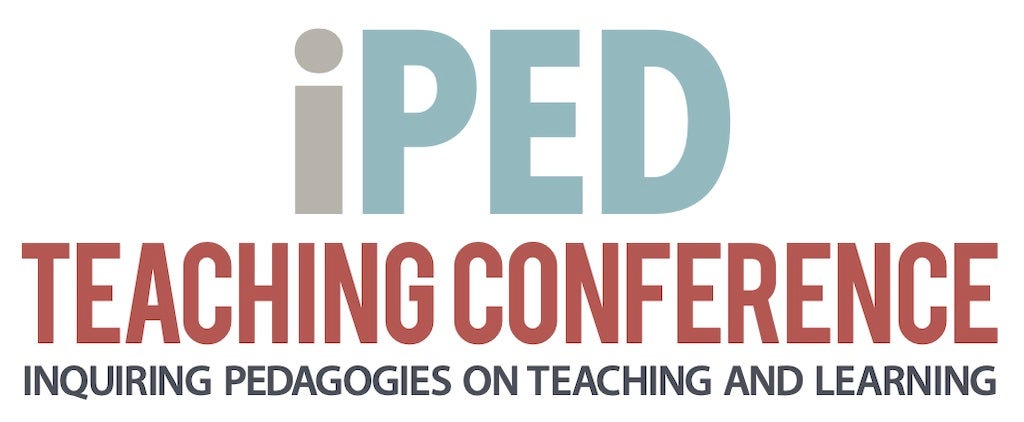
Hosted by the Center for Teaching and Learning, the Inquiring Pedagogies (iPED) Regional Teaching Conference is a professional development opportunity for faculty, staff, and administrators from Marshall University and all regionally accredited Colleges and Universities. Each year, the iPED conference offers sessions based on a central theme chosen by conference organizers. Registrants participate in interactive presentations, panel presentations, roundtable discussions, workshops, and clinics which are developed around the conference theme.
History of iPED: The conference began in 2009 as a Fall Teaching Conference, with sessions led by Marshall faculty for Marshall faculty. The conference was the annual centerpiece of the university’s efforts to provide high quality undergraduate and graduate instruction. In 2020, iPED became a regional conference, inviting regionally accredited Colleges and Universities to be both presenters and attendees. Additionally, the conference was moved to the end of the spring semester, taking place the Wednesday after Marshall’s final exam week.
iPED 2025 is Wednesday, May 14th! Submit your proposal now!
Tricks of the Trade: Using Pedagogical Tricks, Feints, Hacks, Play, Sneak Attacks, and Subterfuge to Improve Your Pedagogy.
Conference Theme
“In the great majority, the intellect is a clumsy, gloomy, creaking machine that is difficult to start. They call it “taking the matter seriously” when they want to work with this machine and think well. How burdensome they must find good thinking!”
–Friedrich Nietzsche, The Gay Science, Book IV, 327
The shifts in higher education over the last few years have been substantial and swift. COVID’s long hangover, budget cuts, and mind-blowing, nonstop advancements in technology like AI have left us hopeful but exhausted. Certainly, we have a new appreciation for the quote, “May you live in interesting times.”
Although it’s tempting to batten down the hatches and stick with our own tried and true assignments, delivery methods, and content, “interesting times” such as these can provide opportunities (voluntarily or not) to consider pedagogical ideas other than what we’ve always done. These new pedagogical ideas don’t have to come from a book or consultant or the latest education fad; the best, most captivating ideas often come from those working on the front lines: our pedagogical peers. What hacks and unorthodox methods have you been experimenting with recently? What procedural or textual risks have you taken pedagogically? What types of pedagogical subterfuge and playful approaches have worked to “trick” students into actually learning, even though they’re sometimes as exhausted as we can be?
This conference is a professional development opportunity for faculty from Marshall University and surrounding colleges and universities. The theme invites faculty, staff, and administrators from Marshall University and all regionally accredited Colleges and Universities to think deeply about transformative pedagogical best practices within diverse teaching environments (asynchronous, virtual, traditional classroom, etc.).
· Tricky Pedagogies: Exploration of both sides of the word “tricky” – how to think about especially thorny, challenging, and difficult pedagogical problems and cunning, sly, and crafty solutions to those problems.
· Tricks to Increase Student Engagement and Motivation: Exploration of tactics and techniques designed to captivate and intrigue (even “delight”) students and thus “trick” them into thinking critically, taking risks, and using their imaginations.
· Tricks and Hacks to Save Valuable Pedagogical Time: Exploration of new and improved ways to disseminate, assess, give feedback, organize, prioritize, and optimize.
· Tricks of Any Sort Not Mentioned Above: How do you get the clumsy, gloomy, creaking machine Nietzsche references above to start?
Session Formats and Proposal Submission Types
· Interactive Presentation: 75 minutes; one or more facilitators; audience interaction, author selected co-facilitators
· Panel Presentation: 75 minutes; three co-panelists for approximately 20 minutes each with Q&A (panels arranged by conference organizers based on topic)
· Workshop/Tutorial: 2 hours; one or more facilitators; participants work on some element of their own teaching practice (e.g., syllabus development, high-impact practices)
· Teaching Clinic: 30-minute time slots for demonstrations of particularly fruitful teaching practices and brief discussion; single facilitator
· Facilitated Roundtable Discussion: 30-minute time slots for open discussions of initiatives either inside the classroom or at the Institutional level; one or more facilitators; audience participation expected
· Traditional: Face-to-face with an audience (session may be recorded and posted for viewing after the conference)
· HyFlex: Face-to-face with some audience members, others join virtually via Microsoft Teams; live recording posted after the conference
· Virtual: Live audience on Microsoft Teams (session may be recorded and posted for viewing after the conference)
· Simulive: Pre-recorded presentation posted ahead of the conference; Live Q & A occurs virtually on Microsoft Teams while your recording is being played during a presentation slot
For questions, contact Jamie Warner, Ph.D. (warnerj@marshall.edu), April Fugett, Ph.D. (fugett5@marshall.edu), or Cody Sharp (sharpc@marshall.edu)